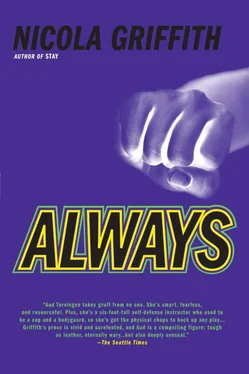"Yes,” she said. "Yes.”
ALL THEway back to Atlanta I stared out of the window at the clouds.
“When will she come?” Dornan said.
“September.”
“Did you buy the painting?”
“No.”
Another hundred miles of cloud went by.
“So what will you be doing with yourself when we get back?”
“Flying to Arkansas to talk to Luz and the Carpenters about adoption.”
“You’ve signed?”
“I’ve signed. Then I’ll be organizing my foundation. You’ll be helping.”
“Me?”
“I need people I trust on the board. And people who know how to make money. I don’t want it to be one of those institutions that just sucks money into a black hole. You’ll have to fly back and forth, Seattle to Atlanta, but I’ll pay for first class, of course.”
“Of course,” he said faintly, then rang for the cabin attendant. “I don’t suppose you know how to make a kamikaze?” She didn’t; they agreed on a nice glass of cabernet sauvignon.
“And you?” I said.
“Ah, well, I expect Jonie will greet me with the accounts all nicely balanced and the perfect cup of Americano. No one makes Americano like Jonie.”
Maybe when I come home at night I want comfort and the smell of coffee and to feel safe. For the first time, I understood something about Dornan before he did.
“What?” he said.
I smiled.
First, this is a novel. I’ve taken a few minor liberties with Seattle and its institutions, icons, and landmarks for the sake of convenience.
Second, this is a novel. While I taught women’s self-defense for five years in the U.K., and while all the statistics used in this book (from the 1985 Women Against Rape study, the U.S. Department of Justice, the Journal of the American Medical Association ) are real, Aud is a fictional character. The way she teaches self-defense is particular and peculiar to her.
Third, this is a novel. My MS is not Kick’s MS—MS, too, is particular and peculiar. However, Eric Loedessoel’s opinion of immunomodulatory drugs is very similar to my own. I’d like to emphasize that this is merely an opinion; I’m not an M.D. and I don’t pretend to be an authority on these things.
A note on self-defense: If you’re looking for good, relatively current (written in the 1990s) nonfiction resources, an excellent place to begin is Gavin de Becker’s The Gift of Fear (Dell). When I started out, in the 1980s, it was with two books: Ask Any Woman: A London Inquiry into Rape and Sexual Assault, by Ruth E. Hall (Falling Wall Press; visit womenagainstrape. net for more), and Stand Your Ground: Self-Defence Guide for Women, by Khaleghl Quinn (Pandora Press). Though the 1985 WAR study is more than twenty years old, the statistics have held up remarkably (and depressingly). I haven’t read the Quinn book for a while; I remember it being a little touchy-feely in places, but it beats most of what I’ve seen in the last few years.
When it comes to recommending a self-defense class, I can speak only to Seattle. If you live here, check out Home Alive (homealive.org) or the Feminist Karate Union (feministkarateunion.org). If you live elsewhere, and know of a good class or instructor, drop me a line via my website (nicola-griffith. com) and I’ll add the link to my Community Resources page.
A handful of people made this a better book. Sean McDonald, my editor, was implacable. Shawna McCarthy, my agent, dealt cheerfully with the highs and lows. Therese Littleton (nothing like the Therese in the book) and Cindy Ward offered insights on an early draft. Kelley Eskridge, my partner, helped most of all; she always does.
A variety of written sources proved invaluable in terms of pointing out things I didn’t know or clarifying things I did (or thought I did). For mirror neurons, I owe a great deal to Sharon Begley’s Wall Street Journal science column; I applied her explanations rather literally. Much of the neat (or diabolical, depending) real estate tax info also came from The Wall Street Journal (Ray A. Smith’s Property Report, June 1, 2006). A House & Garden article from about ten years ago, “Dealer’s Choice: The King of Ming,” by Amy Page, alerted me to Chinese furniture. Lawrence Weschler’s intriguing New Yorker profile of Ed Weinberger was the basis for Aud’s examination of the fictional Wiram exhibit in Atlanta. Some of Kick’s theories about falling and story come from Garrett Soden’s excellent Falling (Norton).
Mostly, though, I just made stuff up.
NICOLA GRIFFITH,the author of Stay, The Blue Place, Slow River, and Ammonite, has won the Nebula Award, the James Tiptree, Jr. Award, and multiple Lambda literary awards. She is also the coeditor of the Bending the Landscape anthology series. She was a women’s self-defense instructor for many years, until she was diagnosed with multiple sclerosis in 1993. Born in England, Griffith now lives in Seattle with her partner, the writer Kelley Eskridge.
STAY
THE BLUE PLACE
SLOW RIVER
AMMONITE
Praise for Nicola Griffith and Aud Torvingen
“Griffith is a writer of considerable gifts. Her sentences shimmer, her powers of observation and description are razor sharp.”
—The New York Times Book Review
“Aud Torvingen is one of my favorite kick-ass, supercompetent, cool-headed, hot-blooded, semilegal girls…. She knows how to fight, kill, survive, and think.”
—Salon
“Griffith has a fine way with character and sure talent.”
—Los Angeles Times
“Griffith’s real genius is a portrayal of the brilliant, though damaged, Aud… a woman who loses herself in the beauty and balletic control of pure violence yet seeks salvation.”
—The Village Voice
“The sexiest action figure since James Bond, six blond feet of sinew, muscle, and bone. She’s also an ex-cop, a martial arts instructor, a master carpenter, and a private dick for hire. She’s beautiful, she’s independently wealthy, she’s in perfect shape: she’s downright deadly. And sorry, guys: she’s into girls.”
—Seattle Weekly
“[Aud] is sleek, sexy, and decidedly dangerous… everything a suspense novel heroine should be.”
—The Advocate
“ Stay is simply gorgeous—a powerful character study in the rough domain of mystery and adventure. It is also a courageous and frank portrait of grief, deeply complex and completely true. There was not one misstep, not one moment when I was not being pulled along hoping for some life-saving miracle. And when it happens, it feels real—stubborn human nature doing what it does. Stay made me glad to read it.”
—Dorothy Allison
"A noir thriller with a female protagonist who makes La Femme Nikita look like a Powerpuff Girl.”
—Details
"Griffith’s tautly balanced prose perfectly complements her heroine’s erratic progress…. [She] skillfully links sensual details with emotional content, anchoring us firmly in Aud’s brutal, beautiful world.”
—
The Seattle Times
“Griffith employs a crime thriller’s page-turning audacity and hard-boiled heroine without succumbing to cheap genre clichés. Like the protagonist, the language has a steely snap to it…. Stay is a captivating read.”
—Out
“Aud, the protagonist of this novel, is an intuitive, old-fashioned sleuth who would do Elmore Leonard proud.”
Читать дальше












